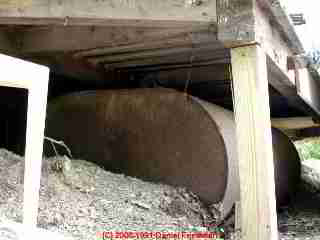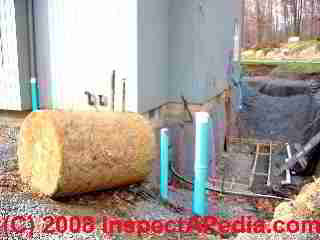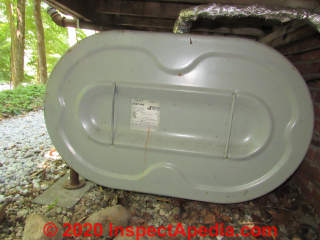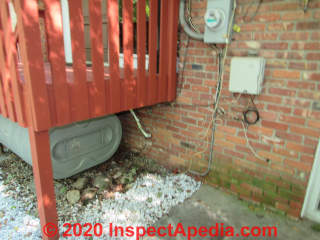 Heating Oil Storage Tank FAQs
Heating Oil Storage Tank FAQs
Questions & Answers about Oil Tank
Types, Installation, Leaks Tests, Repairs
- POST a QUESTION or COMMENT about oil tanks: ASTs, USTs, oil tank life, oil tank regulations, leak testing, buried oil tank abandonment, oil tank removal, oil tank leak prevention, spill cleanup, oil piping, oil filters, oil tank regulations
Heating oil storage tank questions & answers:
Frequently-asked questions and answers about oil storage tanks: installation, inspection, testing, leaks, abandonment, or repairs.
This oil tank information article series answers nearly all questions about above ground or buried oil storage tanks including oil tank inspection & testing, oil tank abandonment or removal, removal, oil storage tank & tank piping leak testing, leak prevention, and oil storage tank regulations.
InspectAPedia tolerates no conflicts of interest. We have no relationship with advertisers, products, or services discussed at this website.
- Daniel Friedman, Publisher/Editor/Author - See WHO ARE WE?
Oil Storage Tank FAQs
These questions & answers about oil storage tanks were posted originally
at OIL TANKS - home; please be sure to see that information too.
Question: is it ok to put a heating oil tank on its side?
At an inspection yesterday I came across an oil tank which was positioned horizontally. I haven't seen this before and was wondering if there's an issue with it.
Please let me know as soon as possible.
- Dov Ber Kahn, a home inspector in Rockland County, NY has contributed photographs of various building features. Mr. Kahn is a licensed home inspector in New York and New Jersey, and can be reached at Website: Kahnbhomeinspectors, Tel: 845-445-8234, Email: kdovber@googlemail.com
Moderator reply:
From the welded-on feet-brackets, the position of the label and the presence of a tapping on the "flat" side of the oil tank in your photos, I infer that this is a Granby oil storage tank that was designed to be installed "flat" or on its "side".
For example, Granby's Model 204701P is a 275-gallon oil tank that is intended for horizontal installation. The companby also has a "horizontal" 330 gallon oil storage tank as well as other models.
See this
- GRANBY RESIDENTIAL OIL STORAGE TANK DRAWING [PDF] Source: Granby Industries L.P. 98, rue des Industries, Cowansville, Quebec J2K 0A1, Canada T 450-378-2334 F 450-378-5202 @ sales@granbyindustries.com https://www.granbyindustries.com/
The company also provides fiberglass oil storage tanks, double-walled tanks and other models.
On 2019-12-23 by (mod) - How can I tell how many gallons an unmarked oil tank holds ?
 James, please see your question re-stated and a detailed reply now found in the article on this page: OIL TANKS
James, please see your question re-stated and a detailed reply now found in the article on this page: OIL TANKS
On 2019-12-19 by James E. McGrail
How can I tell how many gallons an unmarked oil tank holds ? There are two numbers on the one in question on the "Underwriters Lab. plate --- as follows . P 963220 and
MH-15475-1 . it also says "inside tank for oil burner fuel . I can be answered via "E" mail at maccountry2264@yahoo.com I appreciate your help .
Mac McGrail
On 2019-10-07 by (mod) - can I just fill in the oily hole where my leaky buried oil tank was located?
PRobably not, Americo.
Depending on where you live, Americao, to avoid violating environental laws
1. ALL oil-contaminated soil must be removed - the company can't commit to you how much that is before they actually excavate and test
2. that removal must be done by a suitable, often licensed contractor
Also to avoid finding yourself unable to sell your home in the future or facing legal issues around disclosure of a prior oil leak, you need to have documentation that the leak was properly handled,
that the contaminated soil was removed, and that the cite was tested and proved acceptable to environmental laws where you live.
In New York that's the NY DEC. You can contact the nearest New York DEC regional office or call the Spill Hotline (1-800-457-7362). DEC for more assistance.
Here is an excerpt from New York's oil tank leak laws:
Oil spills at homes and businesses
A homeowner or resident who becomes aware of an oil spill on the property should report the spill or leak to the DEC Oil Spill Hotline within two hours (800-457-7362). If the discharge enters or threatens to enter the environment (such as soil or water), regardless of the size of the tank or the leak, the leak or spill is subject to state or federal oil spill laws. Thus, for example, even a spill of a gallon of oil into a ditch is covered.
A spill can threaten the environment even if it occurs in a basement, for example through a floor drain or crack. Generally, the leak or spill has to be stopped, the spill area has to be evaluated, and a cleanup has to be undertaken. Cleanup costs increase the longer the spill goes unreported.
Although the owner of the tank is responsible for cleanup costs, other responsible parties may be compelled to pay some or all of any costs. Homeowners may want to contact their insurance company to determine whether costs and damages from oil spills and leaks are covered by their homeowner insurance policy.
See the complete oil tank and tank leak regulations for all US States at
OIL TANK LEAK & ABANDONMENT REGULATIONS
On 2019-10-07 by Americo Rodriguez
Question, I had a 550 gallon leaky oil tank removed from my front yard. I had 40 tons of soil removed and discarded accordingly from hired Company X I hired.
Company X is not committing to any final tonnage removal from yard.
Can I just stop here and fill in the empty area without any legal problems? I live in Putnam County New York. rmicrobes@aol.com
On 2016-07-29 by (mod) - basement oil tank life
Kevin please search InspectApedia.com for OIL TANK LIFE to see details; you'll see that oil tank life will vary by environment, tank metal thickness & quality, the amount of water in the tank and other factors.On 2016-07-27 by Kevin Schnu
How long of a life does a AST in my basement haveOn 2016-05-01 by James Gordon
Can I locate my fuel oil tank alongside a concrete block wall on a concrete surface at least 10 feet or more away from the furnace?On 2016-02-06 by (mod) - oil tank fume cleanup
Where the items absorbed fumes only, laundering and cleaning usually works. But until the spill is completely cleaned up it'll be tough to have success.On 2016-02-06 by morgan
Hi I am a renter who recently had an oil tank at the home I rent leak oil into the ground outside of the home. The entire house and all of our belongings including matresses furniture pillows,clothes books papers everything smells like oil.
I am wondering what is salvageable and what I can do to remove the overwhelming smell. I have an infant and 2 young children and am at a loss on what I can save. Please if any1 has any help I would greatly appreciate it!
On 2016-01-17 by Lisa
I'm in the process of purchasing a home and luckily inspection found a buried tank. Tests showed contaminated soil, the tank and contaminated soil have been removed to DEEP standards but I'm told some contaminated soil remains, it's close to the foundation of the house.
The leak was not significant, No signs of water contamination, not possible that it would affect neighbors as it is in an isolated location.
My question is what risk I have regarding the remaining contaminated soil. It seems possible at some point the contaminated soil could affect drinking water, The foundation could be compromised, etc. the house is also listed on the country web site. It seems that could also affect the value of the home and the ability to sell.
I'd appreciate any information you could provide. Thanks so much.
On 2016-01-09 by (mod) - oil tank data tag information
Yes older oil tanks have a welded-on data tag with some basic information; newer oil tanks that I've seen have a stick-on label instead. That's not going to give much detail beyond a UL Listing, tank size, and rating, and perhaps the tank manufacturer.
I'm not familiar with owners manuals provided for oil storage tanks.
In Canada there are government-sponsored oil storage tank guides such as one provided by the DEC for Newfoundland and Labrador. Those won't discuss your specific tank nor any cathodic protection that may have been installed.
On 2016-01-09 by Anonymous
does my tank have a info plate and I hope it might be located on the top somewhere what say you for this ?On 2016-01-09 by (mod)
Tom:You might get help by contacting local oil tank installers in your area to ask who installed the tank.
On 2016-01-09 by tom
I have a in the ground tank and now can't find the info packet it is a cathodic protected tank I know the tank # but cant find the owners manuel etc I NEED TO GET FURTHER INFO ON MY TANKOn 2015-11-19 by (mod)
Interesting question Alina.Sure the dryer is venting warm moist air. It might also be warming the oil tank.
But it'd take some odd geometry for the dryer exhaust to actually enter the oil storage tank in any volume. I can imagine a worst case (falling outdoor temperatures, tank interior cooling so it draws in a bit of outside air and the dryer is venting moist air at that time) but even then I doubt much moisture would enter the tank from the dryer vent.
Moiisture can collect over years of changing temperatures from air movement in and out of a tank alone, but that wouldn't happen in a short time.
Use our page bottom CONTACT link to send me some photos for further comment.
On 2015-11-18 by Alina
Hi, Can you tell me if having a dryer vent right next to an outdoor oil tank would cause large amounts of water to collect in tank due to condensation? The outdoor tank was installed recently (the house was built with an underground tank originally) and wedged between the dryer vent and a propane tank.
During this past winter (our second one at the house) the burner failed, most likely due to excessive water in the fuel tank (we were told 9 gallons). I have photos to show how close together they are--will try to attach or send separately. I am trying to understand how so much water got inside the tank and wondered if the hot moist air from the vent is a factor. Thank you for your help!
Question: where can I get financial aid for oil tank removal?
(Apr 3, 2014) Edward Alwis said:
Hello
My 275 oil Tank started to leak yesterday. The local oil company came and replaced it. But asking for more 2000 to replace it . I cannot afford this ?. Is there any program that I can apply to get some assistance?
Please email me ealwis96@gmail.com
Reply:
Edward, some states or municipalities have financial aid for oil tank replacement. I'd start by calling your local building department.
We give more extensive information on financial aid for oil tank removal at
inspectapedia.com/oiltanks/Oil_Tank_Financial_Assistance.htm
Question: oil tanks legal for rental properties?
(May 28, 2014) Mr Vernon Anning said:
Are metal oil tanks legal in rented home properties
Reply:
Vernon
I have not been able to find any regulation that differentiates in the types of oil storage tank material based on a property being rented versus occupied by an owner.
Question: should the seller remove an abandoned oil tank in Richmond VA?
(June 7, 2014) BevO said:
We are trying to buy a house in Richmond, and our inspector has found that there is an abandoned underground oil tank. Should we ask the seller to remove it? If we must remove it, about how much would it cost us to have it removed and replace the soil for the area which the tank occupies? Thanks
Reply:
Nice to hear from my home town, though when I lived in Richmond we still heated with coal.
Our best advice for home buyers looking at a property where there is a buried oil tank is in the article above. If any of that was unclear please let me know.
In general what a home seller "should" do when selling a home is set by the terms of contract of sale as well as good sense in making a property marketable. If the oil tank has not leaked, most likely its removal (rather than proper abandonment in place) is not justified.
Question: what kind of oil is put in outdoor residential oil storage tanks
(June 14, 2014) Anonymous said:
what type of oil do i need when it is stored in an outside tank ?
Reply:
Anon
the choice of type of oil depends on its use;
Home heating oil is usually No. 2 heating oil. In a freezing climate you may need to use a pour point depressant or kerosene mix to avoid oil waxing and loss of heat.
See
Question: Are home owners required to put a drip pan under their oil tank? Oil tanks are leaking in my mobile home park.
(July 20, 2014) Kathy Parmer said:
I live in a mobile home park in Lititz, PA. Is there a law that requires home owners to have a drip pan under there oil tanks?
I know that several of them are leaking. There are also numerous under ground oil tanks that are no longer in use. Some days you can actually smell fuel oil in the air.
The owners of the park reside in CA. They allowed homes to be set up right over the fill line sticking out of the ground. Is there a government agency to contact? Thank you for your assistance with this matter. Kathy
Reply:
Leaky oil tanks must be reported to your state's department of environmental protection, typically within 24 hours.
Question: which way up for "oil line check valve"?
(Dec 2, 2014) Ralph said:
Does it matter if the check valve in the supply line has the bolt on the top or the bottom? I can get a reading on the vacuum gauge(burner runs ok,but has a whine)
Reply:
Ralph some check valves only work in a horizontal position with the marked valve top up. Others include mechanisms allowing the valve to operate in any position. So I don't know about your valve.
See OIL SUPPLY LINE CHECK VALVES
(Dec 2, 2014) Ralph said:
Cant get a reading on the vac gauge.
Reply:
Ralph
Yes, on at least some check valve models there is an internal hinged flapper that will not work properly if upside down.
Question: loud BANG from the crawl area where we have an abandoned oil tank
(Jan 28, 2015) Anonymous said:
I have recently abandoned my oiltank in my crawl area it is in horizontal position I drained most of the oil and caped all the plug.
Every now and then we hear a lowd bang from the crawl area .can this be from the old 280 gal oil tank and if so what can I do to stop this loud bang that can wake you up im positive its not the water pipes expanding and contracting I put a pressure reducing valve on the water main with a expansion tank
thank Tom M
Reply:
Thermal changes could be making the empty tank steel warp and sound bangy. Have someone take a look.
05/11/2015 NHFireBear adds:
Anonymous (regarding abandoned oil tank): State and local codes vary, but the national NFPA 31 Standard for Installation of Oil Burning Equipment requires that the old oil tank be emptied, purged and removed from the premises.
However, if you converted fuels and want to keep the existing tank in case you switch back, you have to LEAVE THE VENT PIPE intact and open, plug the fill pipe with concrete and all other pipes must be capped or sealed.
See NFPA 31 (2011):7.12.
Atmospheric pressure changes can, in fact, cause a sealed tank to "bang" as its walls expand and contract.
...
Continue reading at OIL TANKS - homeor select a topic from closely-related articles below, or select a topic from the closely-related articles below, or see the complete ARTICLE INDEX.
Or see this
Oil Storage Tank Article Series
- OIL STORAGE TANKS - home
- OIL TANK ABANDONING PROCEDURE
- OIL TANK ABOVE GROUND (AST) GUIDE
- BURIED OIL STORAGE TANKS - home
- OIL TANK CODES & STANDARDS
- OIL TANK INSPECTION & TROUBLESHOOTING
- OIL TANK LEAKS & SMELLS - home
- OIL TANK LIFE for ASTs and USTs
- OIL TANK PIPING & PIPING DEFECTS - home
Suggested citation for this web page
OIL TANK FAQs at InspectApedia.com - online encyclopedia of building & environmental inspection, testing, diagnosis, repair, & problem prevention advice.
Or see this
INDEX to RELATED ARTICLES: ARTICLE INDEX to HEATING OIL, OIL BURNERS, OIL FIRED HEATERS, OIL TANKS
Or use the SEARCH BOX found below to Ask a Question or Search InspectApedia
Or see
INDEX to RELATED ARTICLES: ARTICLE INDEX to HEATING SYSTEMS
Or use the SEARCH BOX found below to Ask a Question or Search InspectApedia
Ask a Question or Search InspectApedia
Try the search box just below, or if you prefer, post a question or comment in the Comments box below and we will respond promptly.
Search the InspectApedia website
Note: appearance of your Comment below may be delayed: if your comment contains an image, photograph, web link, or text that looks to the software as if it might be a web link, your posting will appear after it has been approved by a moderator. Apologies for the delay.
Only one image can be added per comment but you can post as many comments, and therefore images, as you like.
You will not receive a notification when a response to your question has been posted.
Please bookmark this page to make it easy for you to check back for our response.
Comments
IF above you see "Comment Form is loading comments..." then COMMENT BOX - countable.ca / bawkbox.com IS NOT WORKING.
In any case you are welcome to send an email directly to us at InspectApedia.com at editor@inspectApedia.com
We'll reply to you directly. Please help us help you by noting, in your email, the URL of the InspectApedia page where you wanted to comment.
Citations & References
In addition to any citations in the article above, a full list is available on request.
- [1] Fuel Storage] Tank Corrosion Study, U.S. EPA report on gasoline and oil tank corrosion, James H. Pim, P.E., John M. Searing, Suffolk County DOHS, 15 Horseblock Place, Farmingville Long Island, NY 11728, November 1988, for the Office of Underground Storage Tanks, U.S. EPA. ATTN: David O'Brien. The report presents a study of 500 underground storage tanks spanning 24 February 1987 and September 1 1988 and summarizes earlier reports on this same study. Tank sizes ranged from 175 gallons to 50,000 gallons, and oil tank ages ranged from two years to 70 years old. All 500 oil storage tanks were constructed of welded steel, and 12 other tanks that were other than plain steel were also examined. Summary [with minor edits for clarity by DJF]
- Our recommended books about building & mechanical systems design, inspection, problem diagnosis, and repair, and about indoor environment and IAQ testing, diagnosis, and cleanup are at the InspectAPedia Bookstore. Also see our Book Reviews - InspectAPedia.
- National Association of Oil Heat Service Managers, PO Box 380, Elmwood Park, NJ 07407
- "Homeowners Guide to Fuel Storage," Agway Energy Products, Verbank, NY, November 1990
- In addition to citations & references found in this article, see the research citations given at the end of the related articles found at our suggested
CONTINUE READING or RECOMMENDED ARTICLES.
- Carson, Dunlop & Associates Ltd., 120 Carlton Street Suite 407, Toronto ON M5A 4K2. Tel: (416) 964-9415 1-800-268-7070 Email: info@carsondunlop.com. Alan Carson is a past president of ASHI, the American Society of Home Inspectors.
Thanks to Alan Carson and Bob Dunlop, for permission for InspectAPedia to use text excerpts from The HOME REFERENCE BOOK - the Encyclopedia of Homes and to use illustrations from The ILLUSTRATED HOME .
Carson Dunlop Associates provides extensive home inspection education and report writing material. In gratitude we provide links to tsome Carson Dunlop Associates products and services.




No one has commented yet. Be the first!